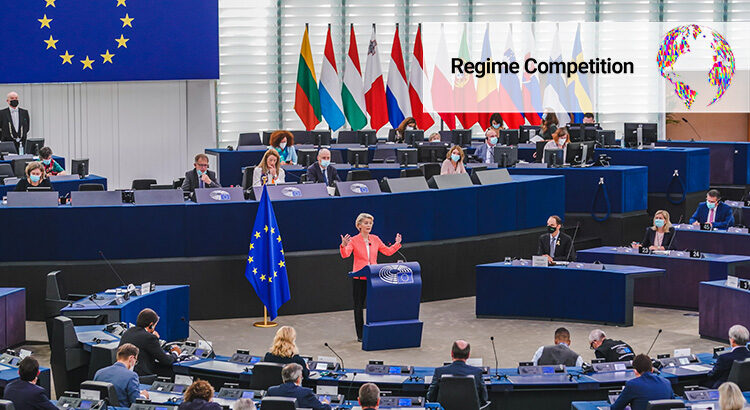The ways in which foreign interference by China, Russia and others are currently discussed in Brussels indicate that the EU is considering moving away from liberal principles in the area of international civil society support and the foreign funding of NGOs in particular. Based on a co-authored comment in the Heidelberg Journal of International Law, this blog post argues that it is helpful to read the current EU debate on foreign interference in the light of the ongoing, conflict-ridden transformation of the global order.
In order to protect themselves against the global rise of “illiberalism”, liberal democracies may need to adopt illiberal policies. This, in a nutshell, is the uncomfortable, seemingly paradoxical argument that US political scientists Alexander Cooley and Daniel Nexon made in “The Real Crisis of Global Order”, an article published in Foreign Affairs in early 2022. In previous years and decades, Cooley and Nexon suggested, the reduction of “international barriers” had facilitated “the spread of liberal movements and values” (p. 103). But currently, the liberal international order “favors a diverse array of illiberal forces, including authoritarian states, such as China, that reject liberal democracy wholesale” (p. 104). As their openness “has become a liability”, “liberal democracies must adapt to fend off threats” (p. 105), even if such measures break liberal norms, or “blur the distinction between liberal and illiberal practices” (p. 117) and, thereby, also “provide rhetorical cover for illiberal and antidemocratic practices at home and abroad” (p. 118).
The call for illiberal responses is certainly controversial, and rightly so. Empirically, though, Cooley and Nexon raise a question that is crucial for the future of both liberal democracy and the international world order: Are liberal-democratic regimes adapting to the challenges they are currently facing from both within and abroad by compromising, or even giving up, on core principles they have so far rested upon domestically and lobbied for internationally? The current debate about how liberal democracies should deal with foreign interference by authoritarian governments such as Russia or China is a perfect example of the political conundrum pinpointed by Cooley and Nexon. It is, therefore, also an important test case for the empirical question raised.
The EU Response to Foreign Interference
In a comment in the Heidelberg Journal of International Law (HJIL), which was just published online, Lukas Harth, Florian Kriener and this author critically discuss the ways in which the EU is currently setting out to deal with foreign interference. Since the debates about Russian meddling in the 2016 U.S. presidential elections and the British Brexit referendum, the issue of foreign interference has also gained attention in Brussels. In 2020, the European Parliament (EP) established a “Special Committee on Foreign Interference in all Democratic Processes in the European Union, including Disinformation”. Based on the work of this committee, the EP, in March 2022, adopted a resolution that contains strong language against foreign interference and proposes a set of potentially far-reaching measures, for instance when it comes to restricting the foreign funding of civil society organizations (CSOs) in the EU. In 2022, Russia’s invasion of Ukraine as well as the eruption of a major corruption scandal in the EU (“Qatargate”) have further spurred the debate. In response, in February 2023, the European Commission (EC) published plans for a “Defence of Democracy package”. In order to protect “European democracy against covert foreign interference”, this package in particular proposes a legislative initiative to establish “common transparency and accountability standards for interest representation services directed or paid for from outside the EU”.
While avoiding the controversial term “foreign agents”, the planned EU directive would potentially force nongovernmental organizations that “pursue lobbying activities and are recipients of a certain amount of funding from third countries” to report their funding and register as entities providing “interest representation services”. The plan provoked widespread criticism from civil society groups (see, for instance, here and here) and a group of EP members. As a consequence, the EC decided to postpone the presentation of the package and conduct an impact assessment first. In our HJIL comment, my colleagues and I very much welcome this decision, given that the planned legislation “may indeed give rise to overly broad foreign-funding restrictions within the EU that would, at the very least, contribute to stigmatising foreign-funded CSOs.” In addition, it could be used by other governments in order to justify (further) restrictions on the forms of foreign interference, including in the area of democracy and human rights support, which they regard as illegitimate. In this sense, a restrictive EU approach to foreign interference also undermines the EU’s efforts to oppose restrictive foreign-funding regulations in member states such as Hungary as well as abroad and runs counter to the EU’s own practice of supporting CSOs in repressive settings (in fact, as highlighted in our HJIL comment, the EU itself is using “more covert” means in its external support of human rights defenders under threat).
Competing Foreign Interference in a Multipolar World
Reading the EU debate on foreign interference against the argument made by Cooley and Nexon suggests that politicians in Brussels, indeed, seem to be guided by a similar understanding of how the world has changed. Apparently, the liberal norms on international civil society support, which were so far regarded as both morally right and politically useful (facilitating EU and EU member states’ activities around the world), are increasingly considered as threatening. The 2022 EP resolution explicitly depicts “foreign interference, information manipulation and disinformation” as “an abuse” of “fundamental freedoms” that is “undermining democratic processes in the EU and its Member States”. As a consequence, norms and regulations are being considered that clearly deviate from both previous EU standards and rhetoric as well as from the EU’s own practices in other countries.
The fact that the EU – but similarly, also the US – is currently discussing foreign interference as a serious challenge thereby testifies to the ongoing structural changes of the world order. Until quite recently, “foreign interference” was mostly a charge that governments in Africa, Asia, Latin America, or Eastern Europe raised in order to criticize and potentially restrict Western policies of democracy and human rights promotion, including through the financial support of civil society organizations. In this context, Western governments presented themselves as unequivocal supporters of liberal principles arguing against almost all types of regulations on foreign funding. That this unequivocal support is obviously gone, thus, reflects not only some newly gained insight that also liberal democracies might need illiberal measures to fend of illiberal challenges. It is also the consequence of the West’s loss of its privileged position as solely the subject, but not the object, of external interference in domestic politics. The debate on foreign interference in the EU, therefore, raises questions that go far beyond the specific question of how to tackle threats from the Chinese or the Russian governments. What is at stake, from a world order perspective, are the norms that guide the regulation of foreign interference in the emerging multipolar world. As long as the EU holds fast to its support for a “rules-based international order” built upon “universal values”, such norms – whether liberal, illiberal, or perhaps also non-liberal – should, in principle, be applicable to Chinese or Russian as well as to US and other countries’ involvement in the EU, and just as much also to EU and EU member states’ activities in third countries.


